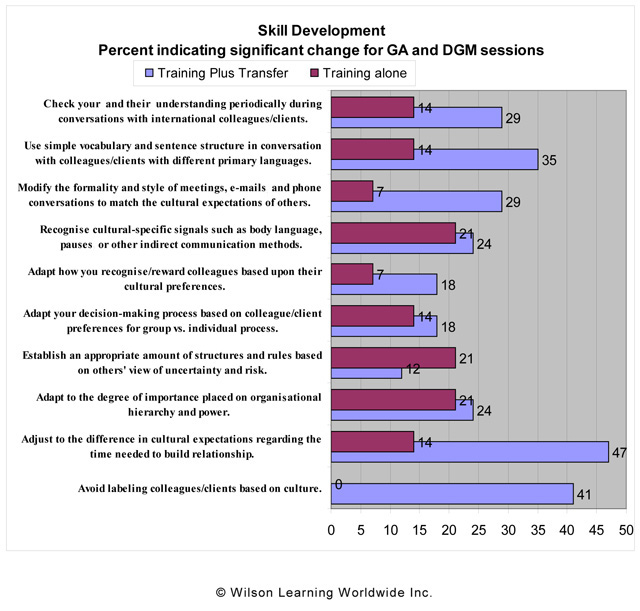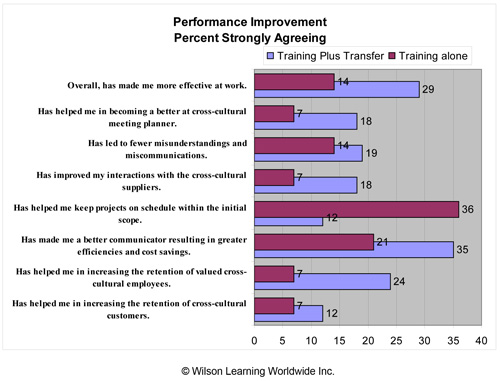Impact of learning transfer on global effectiveness
Enhancing worldwide collaboration
Executive Summary
This study examined the impact of learning transfer activities on the effectiveness of Global Effectiveness, a learning programme designed to teach skills to effectively communicate and build cross-cultural relationships. The study compared skill usage and performance impact between two groups; one group received only skill training (training only group) and the other received the skill training plus activities designed to support the transfer of learning to job performance (training plus transfer group).
Results indicated that learning transfer activities improved both skill usage and performance outcomes. Skill usage was over 100% higher and performance impact 48% higher among those who received training plus learning transfer activities when compared to those receiving training alone.
The results also indicated that while all of the learning transfer activities were valuable, skill practice was seen as the most valuable, followed by activities to help learners apply the skill to actual work situations and reinforcement e-mail reminders. Overall, this study provided strong support for the use of learning transfer activities in ensuring the positive impact of learning on business performance.
Enhancing Global Performance
This study was conducted with a global communication technology company. With operations and clients throughout the world, breaking cultural barriers and becoming an integrated global organisation are high priorities for the company. In order to accomplish these priorities, employees need to know how to effectively communicate and build cross-cultural relationships. In other words, developing global effectiveness skills is critical to the company's success.
One of the most critical global effectiveness skills is cross-cultural communication and collaboration. Ensuring employees possess the skills to work on global projects and work teams is key to the company's success. However, it was clear that a training programme alone was not enough. Employees have to use the skills they learn in the programme in actual work performance to make a difference on the overall organisational performance. Thus, this organisation decided to partner with Wilson Learning to study the effect of specific learning transfer approaches in global communication skills development.
Improving Global Effectiveness Training
A great deal has been written about the limitations of training alone and many organisations have used learning transfer activities to make sure training transfers to actual work performance. Nonetheless, most studies on learning transfer impact have focused on technical training or knowledge acquisition. There is almost no information about the impact of learning transfer activities on non-technical training, such as communication skills, interpersonal relationship skills and, in particular, cross-cultural relationship skills.
It is for this reason that we felt it was important to do this study. "Early on, we realised that if adding learning transfer activities to training alone showed positive impact on performance for a programme like Global Effectiveness, this study would benefit professionals in the field tremendously," explained Dr. Michael Leimbach, Vice President of Global Research and Design for Wilson Learning, whose team implemented the study. "Furthermore, if we can show which specific learning transfer activities have an impact on the use of global communication skills, organisations can have a greater impact on the effectiveness of global teams and can utilise these transfer activities to develop and boost their global team performance."
The Study
The Participants
Participants in this study were part of the client's high performance pool. This consisted of the top 10% of managers and professionals who were seen as critical to the long-term success of the company and, thus, were given additional learning opportunities to prepare them for dealing with future organisational challenges. In total, there were 53 participants in the research study.
The participants were divided into two groups, each experiencing a different version of the programme Global Effectiveness.
In the first group (training only group), participants learned the skills of Global Effectiveness in a one-day workshop through discussion, experiential activities and short lectures.
In the second group (training plus transfer group), participants received the same learning content as the first group, but also experienced three additional learning transfer activities:
- Skill Practice: An additional day was added to the programme to provide participants with opportunities to practice the skills learned.
- Application: During this additional day, participants worked directly on a real-world job situation and developed action plans to apply the new skills to that situation.
- Reinforcement: Every two weeks after the workshop and continuing for a total of 12 weeks, participants received short e-mail reminders containing suggestions and tips for skill usage on the job.
Measures
Utilisation of the newly acquired global effectiveness skills would not have much value if the skills were only used for a short period of time. This is the fate of many training programmes—once the initial "shot" wears off, the improvement goes away. As a result, we chose to assess performance three months after programme completion. We determined that three months was a reasonable amount of time for participants to use the skills in their work and to experience the enduring effects of the behaviour change.
Three principle outcomes were examined in this study:
Skill Improvement: There were 10 specific skills taught in the Global Effectiveness programme. We asked participants to rate each skill on a four-point scale from "no change" to "significant change." This enabled us to determine whether there was a difference between the two groups in the cross-cultural skills resulting from Global Effectiveness.
Performance Improvement: Skill usage is important, but unless it results in actual changes in work performance, it will not have an impact on the bottom line. Thus, we identified eight specific performance outcomes that Global Effectiveness was intended to affect. We asked participants to rate the extent to which Global Effectiveness skills affected their actual work performance using a four-point scale from "strongly disagree" to "strongly agree." This allowed us to examine the difference in impact on work performance between the two groups.
Impact of Learning Transfer Activity: Since only the training plus transfer group received all three types of learning transfer activities, there is no direct way to study the impact of each. Therefore, participants in the training plus transfer group were asked to provide two ratings of the learning transfer activities. First, using a five-point scale, participants rated the importance of each learning transfer activity from "not important" to "very important." Then they were also asked to rank the top three activities from "most important" to "least important."
Findings
The results of this study provide convincing evidence that learning transfer activities have a meaningful impact on both the use of the Global Effectiveness skills and on overall job performance.
 Skill Improvement
Skill Improvement
The first question we asked was, "Is there a difference in the use of global effectiveness skills between the two groups?" The graph at right shows the impact of Global Effectiveness on the skills.
While the majority of participants in both groups indicated sufficient to significant skill improvement as a result of the Global Effectiveness programme, participants involved in learning transfer activities were more likely to indicate a significant skill improvement. In most cases, the improvements were dramatic. On average, over twice as many participants in the training plus transfer group indicated significant change in skill in comparison to the training only group. The largest differences between the groups were for skills such as:
- Avoid labelling colleagues/clients based on culture
- Modify the style of meetings, e-mails and phone calls to match cultural expectations
- Adjust to how others build relationships
 Performance Improvement
Performance Improvement
The more critical question related to building the company's global capabilities concerned the impact of learning transfer activities on performance improvement. The following graph shows the results for impact on work performance as we compared the training only group to the training plus transfer group.
For all but one of the performance outcomes, participants in the training plus transfer group were more likely to confirm improvement in their work performance as a result of Global Effectiveness skills application. On average, 48% more of the participants experienced significant performance improvement in comparison to training alone participants.
Differences in work performance impact between the two groups were found for the following performance outcomes:
- Increased retention of cross-cultural employees
- Improved interactions with cross-cultural suppliers
- Better planning of meetings involving cross-cultural participants
The only performance impact that was not higher for those in the training plus transfer group was "Keeping projects on schedule and in scope." A number of participants indicated they did not manage projects directly and, therefore, left that blank. This could be a potential explanation for this outlier.
Impact of Learning Transfer Activities
The third major research question we asked was, "Which learning transfer activities were the most useful in supporting the transfer of learning?" To assess this, participants in the training plus transfer group were asked to rate the degree of importance of each learning transfer activity on a five-point scale ranging from "not important" to "very important." Subsequently, to gain better understanding of the relative value of the learning transfer activities, we also asked participants to rank the three transfer activities from "most important" to "least important."
 As the graph at right shows, all three learning transfer activities were rated as important with Skill Practice and Application somewhat more important than the Reinforcement e-mail reminders.
As the graph at right shows, all three learning transfer activities were rated as important with Skill Practice and Application somewhat more important than the Reinforcement e-mail reminders.
While participants rated all of the learning transfer activities as important on the five-point scale, there was a clear set of preferences in the rank ordering. The largest number of participants (79%) indicated that Skill Practices were most important to helping them transfer what was learned in the programme to actual work performance. This was followed by Application and Reinforcement, selected by 31% and 6% of the participants, respectively.
Conclusion
As we delve further in the era of technology and globalisation, the use of cross-cultural project and sales teams, cross-cultural buy-seller relationships and cross-cultural management will become more prevalent. Companies will strive to remain competitive by continuously developing their global capability. Thus, it becomes imperative for employees to know how to effectively communicate and build cross-cultural relationships in the workplace.
Activities that enhance the transfer of cross-cultural communication and relationship-building skills into workplace performance will have a significant impact in helping companies increase the return-on-investment for training and development efforts and in building their global capabilities. This study shows that effective cross-cultural communication skills can be enhanced by the addition of specific techniques to support individuals in their efforts to apply their learning to their work. Specifically, we found that a combination of skill practice, application support and reinforcement of the learning can more than double skill usage and increase performance by 48%, in comparison to providing training alone.








 Please complete this form to download Impact of learning transfer on global effectiveness | Enhancing worldwide collaboration.
Please complete this form to download Impact of learning transfer on global effectiveness | Enhancing worldwide collaboration.



